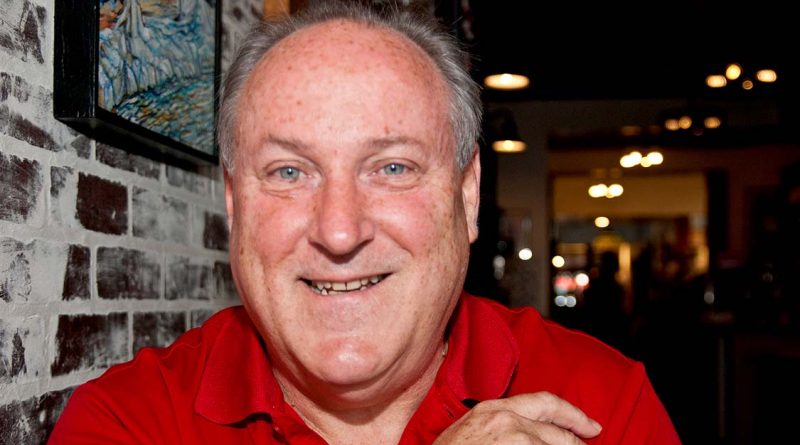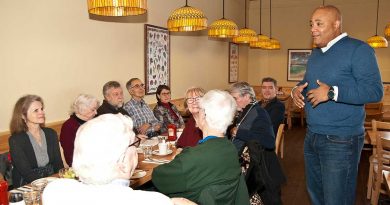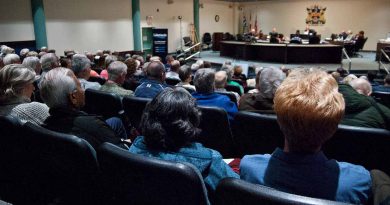The Road To the Federal Election
The Road To the Federal Election
SUNonline coverage of the October 21, 2019 federal election continues with profiles of candidates running in Simcoe North. Interviews are presented as a series about a candidate’s life journey, background in the riding, political philosophies, and the platforms they and their parties have. Each candidate appears in the order they were interviewed.
Gerry Hawes: Back To Ottawa?
By John Swartz
It’s an old trope bandied about during election campaigns, a candidate will run with an “elect experience” motto. It’s used even when there is no incumbent in a race. With Gerry Hawes, the Liberal candidate in the federal election, while not having held a seat, he has experience inside government only one other candidate in Simcoe North can claim.
Hawes is not voicing the line at every turn, but his work experience proves the case.
“Paul DeVillers, I met him because he was on the riding association executive and I was on the executive as well and he ended up becoming the candidate. When the ’93 campaign rolled around I was busy working in Toronto, so I didn’t manage the campaign but I directed it, gave it a lot of strategic direction, and helped with planning, recruiting and so on,” said Hawes
“Then he got elected to the House of Commons and asked me to go there with him as his executive assistant because he knew (I) had the most experience in that sort of thing and someone he knew and liked and trusted.”
There was a short period when Hawes left to work in the private sector, but when DeVillers was named to cabinet a minister of sport Hawes returned to DeVillers’s side.
“During that period he was minister of sport, which isn’t a senior portfolio, but it is a portfolio with a lot international responsibilities, attending world doping agency conferences and meetings with counterparts around the world, because organized sports is a very international exercise. So Paul was travelling a lot and during that period I served basically as the surrogate member of parliament here. When Paul would normally be making an appearance at a public event, or sitting in on a meeting with local mayors to discuss an issue it was actually me doing that during that period.”
“When you were taking to Gerry, you were talking to Paul. That’s the relationship that we had and people understood that in the community as well. It wasn’t, “Oh I’ve got to go back and ask Paul and see what he thinks.” For the most part, most of the circumstances were things I could speak on his behalf and commit on his behalf, and he trusted me and I understood what was reasonable. That worked out really well.”
It seemed to work, being the MP’s emissary.
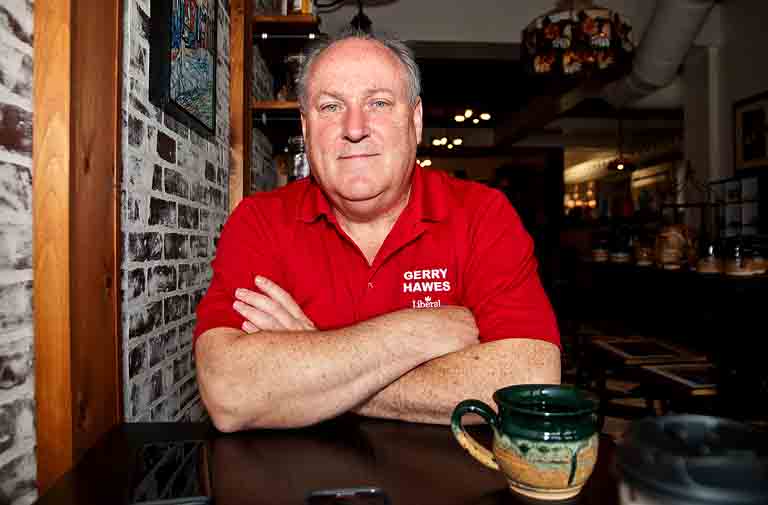
“I call it the gold standard of service. We put out excellent services to constituents in our offices in Orillia and Midland, and in both languages. We really went the extra step to make sure that the service was great. But being a good, strong member of parliament is more than providing good constituency service. The stuff that we do in Ottawa is really important as swell. You’ve got to be able to navigate the bureaucracy and open doors, navigate the decision making process and influence people, all of that stuff in order to get things done on behalf of your constituents and to move the agenda along.”
Hawes’s political life preceded and continued after working for DeVillers. Hawes grew up in and went to school in Orillia.
“I’ve lived on the same street in Orillia my entire life,’ said Hawes who bought his house from his mother. After graduating from Twin Lakes Secondary School, he went to the University of Western Ontario.
“I went there because none of my friends from high school were going there. I wanted to maintain those relationships, but I also felt like I needed to do something on my own without having my friends around me as a support system,” he said. Hawes started in engineering.
“In the first year I switched and opted to do a general BA. I was doing OK in it, but I didn’t like the ethos of the faculty and the highly structured nature of the study. I ended up taking a whole variety of courses from geology to economics, to French and Spanish, just a grab bag. I don’t know if any universities allow it now, but at that time you could graduate with a bachelors with no area of concentration.” After graduating he decided to continue at the University of Ottawa to get a business administration degree.
“It’s interesting because (unlike) Western, some people would describe it as a country club university; the University of Ottawa was downtown Ottawa, for me that at the time was exciting. People were speaking French and English and the international students, there were many of them, lots of hustle and bustle.”
“At the time you had to be bilingual to graduate. In order to avoid having to take French classes you had to write a test at the beginning. I passed that. I lived with a lot of French students, spoke French on a pretty regular basis, so I got pretty bilingual. I was really comfortable in French. Then after university, after 25 years not speaking a word of French you lose your confidence and ability to speak fluently. For the last ten years I’ve been working hard on it and I am now fluently bilingual. I can speak and write in French.”
Hawes did not finish the second degree.
“I went into business with a business partner I met the first year at the University of Ottawa. We opened up a business importing skin care and beauty products from France and Switzerland and distributing through department stores in Canada (Hudson’s Bay was a major client). The timing was right. The intention, like everybody else, was someday going back and doing it, but life gets in the way,” Hawes said.
“Then the recession hit and they cut back on their buying. I did get one really good lasting thing out of it, which is that my spouse, Ambrose (Doucette), was my employee and that’s how we met. We’ve been together for 30 years and we’re now married.”
The next job was as a consultant with Community Charitable Counseling helping to raise money for church, school and hospital construction projects in places like Buffalo and Montreal.
“That actually brought me to OSMH for a while. I remember having an office in what was the nurse’s residence. It was nice being able to do that kind of work in Orillia,” said Hawes.
Getting Into Politics
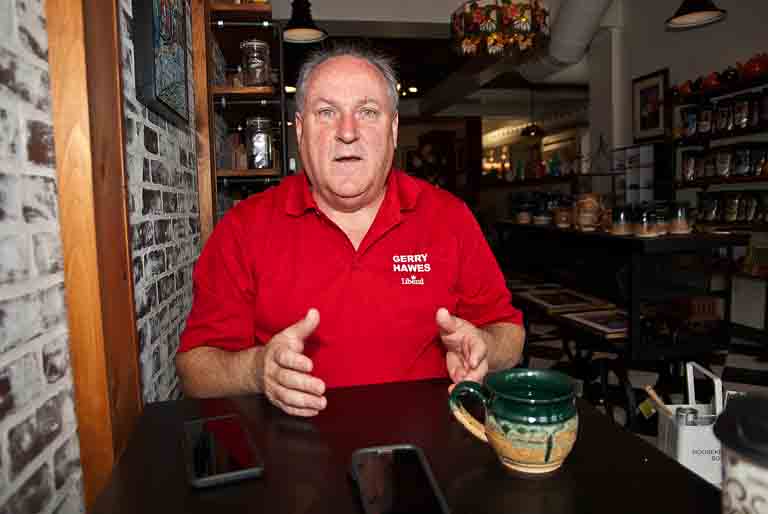
Hawes remembers tagging along with his grandmother when he was a child, distributing pamphlets at election time.
“I do have some vague recollection of a sign of Pierre Trudeau on a front lawn. That would have had to be in the 1968 election,” he said. His interest grew through his high school years.
“I had an interest in Liberal politics and politics in general, but I wasn’t involved in the party. I didn’t do that until I graduated from university. In fact I think it probably was during that capital campaign at Orillia Soldiers’’ Memorial Hospital that I actually connected with the local riding association and had my first involvement in the party in a formal way.”
Hawes eventually managed campaigns in federal and provincial elections. As noted, this lead to Hawes working directly for DeVillers for 6 years. He then took a private sector job with Financial Executives International as the director of professional affairs, helping chief financial executives across all industries stay on top of regulations and standards. In one case he was on a joint committee with people from the Association of Canadian Pension Management which broadened his knowledge of one the things Canadians are most concerned about.
“I learned a lot from a technical perspective how pensions get managed and the difference between a benefit pension and the other types of pensions. That provided me with some interesting background in pension management, even though I wasn’t a pension manager, but it certainly helps me going into public service.”
Hawes returned to DeViller’s office and following DeViller’s retirement in 2006 there was one more campaign to manage for Aileen Carroll.
“I’ve also spent time in Queen’s Park, so I’ve spent a lot of time in the halls of power doing that kind of work and frankly that’s the main reason I decided to run in this election. It wasn’t something I was planning to do. A lot of people assumed I was always going to run for member of parliament, and when I was young I kind of thought about that, but for the past ten years or so that was right out of my mind.”
“I was asked a couple of times to consider it. The first time I said I’ll think about it. The second time I thought, you know what? I should take this seriously because I know I can be a very strong member of parliament. I’ve got everything it takes. I’ve got the passion for it. We haven’t even talked about my policy background yet. I just have every ingredient that from day one I can be a great, local member of parliament, but on top of that, I can be a great influence in Ottawa.”
“I should do this and I can do this, and frankly it’s time to freshen it up at the local level because my opponent has had 4 terms of office already and I think it’s getting a bit tired and I think we need to have a progressive voice who is a stronger voice there and I believe I will be a stronger voice.”
Going Over To The Other Side
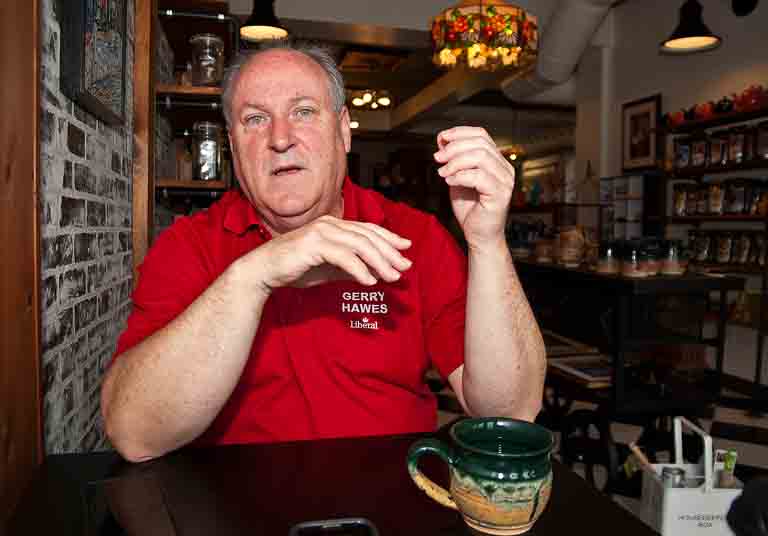
The last campaign Hawes ran for Carroll wasn’t it for political invovlement. He ended up following her to Queen’s Park.
“I absolutely loved that campaign because she was just a wonderful person to be with. Lovely woman, fun loving, great person, smart as hell as well.”
“We chatted and decided I would join the staff if she got appointed to cabinet. The irony of that is I remember walking down the driveway that day, we knew she wouldn’t get a senior portfolio, but we figured she’d probably get something. I remember yelling, “watch, you’ll probably get culture,” in kind of a joking fashion,” which is exactly what happened. Hawes found out the cabinet post was more than it first appeared.
“We realized that’s a pretty significant economic industry in Ontario because we have all of the cultural industries, film and television production, interactive digital media, magazine and book publishing, sound recording and music touring, all those things are part of that portfolio. It wasn’t just the art and heritage and libraries. When you put all that together, that’s pretty significant. We had a laugh about that thinking it was going to be a really junior ministry, but it actually wasn’t.”
Carroll offered the job with a condition, that Hawes not be in her employ by the next election, don’t stagnate. Working for politicians really does not have long-term prospects.
“I loved the work and I was good at it, but it was almost like a treadmill and every now and then the treadmill stops and you have to find another treadmill to hop on.” Then a job opened up on the administrative side of the ministry of tourism, culture and sports. Hawes applied and got the job and has been there since.
“I’m responsible for developing and promoting training in those sectors, but not craft training, so I’m talking about business skills training, particularly for artists. That is a huge challenge for artists. They’ve got a passion for their craft, that’s why they do it. Paying attention to the business side, the numbers and stuff isn’t really what they want to do. The whole idea is to get them to that in a way that is sensitive to the need so that it’s not an obstacle; it becomes something they are willing to do in their practice.”
It’s clear listening to him talk about it he’s enthusiastic for that aspect of his work, but it’s not his top responsibility.
“Most of my work really has been developing supports to grow the cultural industries in Ontario, book and magazine publishing, on the business side of culture. Those are really good, clean, quality jobs. It’s becoming an increasing part of our economy,” Hawes said. While not part of the portfolio, he does work with others who have the similar job in television, film and digital media areas. News is part of his responsibility, but as yet not prominent while the provincial government waits for federal government policy to emerge. That doesn’t mean he isn’t paying attention to news.
“Like a lot of Canadians I’m really concerned about the inability to have local journalism in a lot of places. We’re lucky here,” he said, recapping the list of local news sources, but other communities aren’t so lucky. “It results in people being less engaged in their community and important activities like an election campaign. It’s just not healthy for a community not to have that local journalism perspective.”
Hawes has been on leave from his Queen’s Park job since he got the nomination. He’s been hitting the bricks since August.
Housing
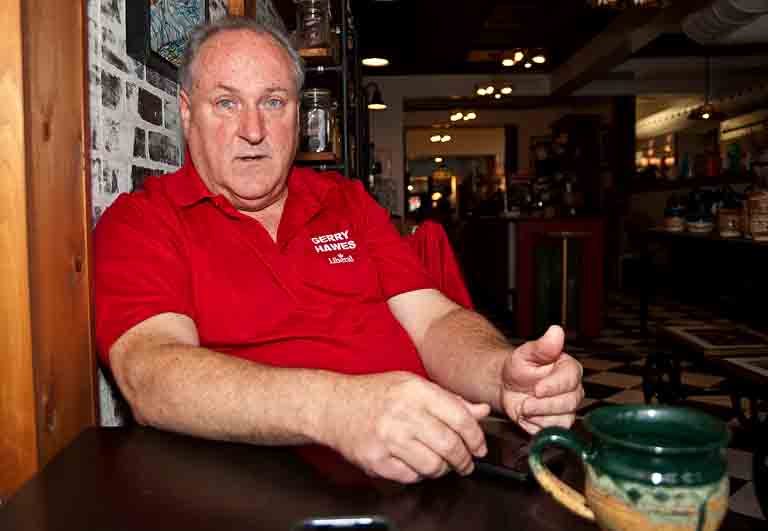
“I wasn’t sure how I’d feel about door knocking, but I actually really like it. I’ve had great response, a lot of great conversations, got some good insights that have added to my knowledge of what are the important issues in the area,” Hawes said.
‘One thing I heard a lot of, particularly with seniors, but not exclusively seniors, sometimes younger people, who are living in their homes and sometimes not good quality housing because that’s all they can afford and they are very fearful of the future because it’s costing a lot of their income to stay there.”
“It’s a really huge problem, the cost of housing in this riding and really across Canada. We had a $40 million national housing strategy and it’s the first time we’ve had a national housing strategy.” Hawes thinks government programs aside, some of the problem in the housing market is us.
“The thing we have to understand is we need good quality housing options across the gamut. It’s not just about building new houses for first time home buyers. We need that. Sometimes I wonder about the grandiosity of the houses being built. My parents bought a house, it was basically a little shack. It’s been invested in over the years, but now a lot people’s first houses are what back in the day was a dream home.”
“Are we addressing the actual needs properly? If builders are only building that stuff then that’s the only stock available and that’s what people are buying.”
Corporate Influence And The Internet
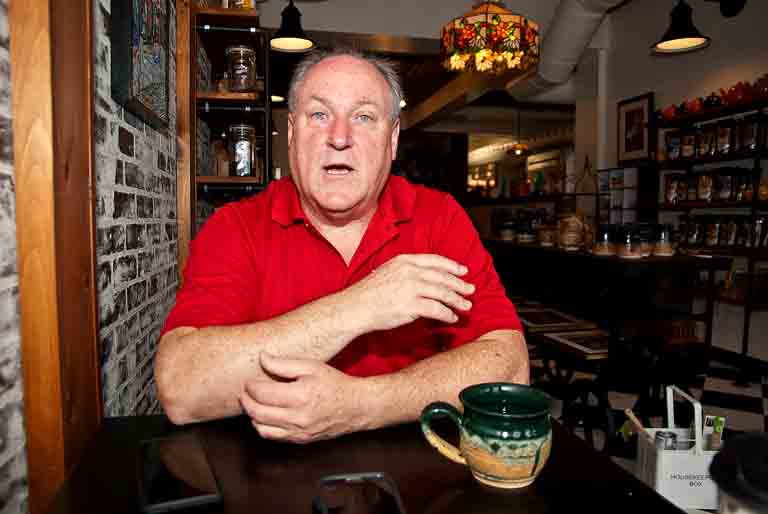
That sounds a lot like values being out of touch with reality. Maybe people’s expectations are being shaped by good marketing and corporate agendas to sell us things we don’t need is the problem. Is the problem a result of throwing out regulations about media ownership resulting in concentration (even as the owners contract the number of local outlets), who then push the same message from many directions? Hawes thinks it’s possible, but there is a bigger problem.
“More importantly in my mind, corporations like Google and Facebook having such a huge influence on the information we get, but not operating in a transparent fashion and basically operating outside of the reach of sovereign governments. That’s got to be fixed. That’s a huge problem.”
Hawes will come back to that point as discussion shifts more directly to the perception of corporate influence on government and the most recent controversy.
SNC Lavalin
“I agree business has undue influence in a number of ways and when you are talking about those gigantic digital monoliths that scares the hell out of me with the way they do with propriety information and the kinds of business things that spin off from that – including what we saw from Cambridge Analytica and interference in election campaigns. That is bad news and that’s got to be dealt with it. All nations have to get together and figure out how do we regulate these gigantic monoliths that are not answerable to anybody, it can’t go on like that.”
“When you are talking about SNC Lavalin I don’t think it’s a situation like that at all (influence). I think in the case of SNC Lavalin, I don’t care what government, what stripe they are, they would have tried to preserve the jobs the government was trying to preserve. That’s government’s job, to make sure there’s continuity of employment and it’s a pretty major corporation. There’s debate of how many jobs might have been lost, but there certainly would have been more and detrimental to that corporation to not have the deferred prosecution agreement (DPA),” Hawes said in disagreement SNC Lavalin got off the hook.
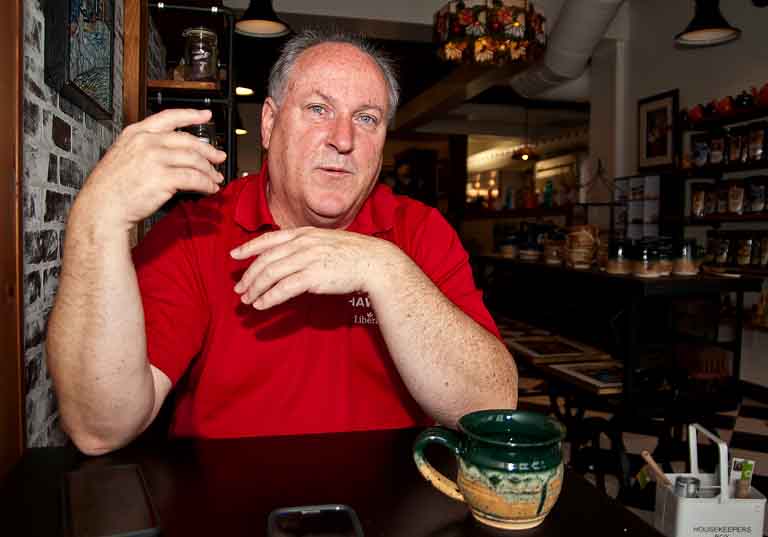
“There’s a lot of misunderstanding about deferred prosecution agreements. All that means is prosecution is deferred. As long as you are doing what you commit to do with the justice department – a lot of corporations actually would rather not go into deferred prosecution agreements because it’s quite onerous with all kinds of checks and balances, all kinds of transparency that’s required, all kinds of things that businesses don’t want to engage in with the government – but apparently SNC Lavalin did want to go that route rather than being locked out of bidding on a lot of contracts across Canada therefore losing business and jobs.”
“If you don’t live up to the agreement you enter into, you can still get prosecuted. I think it’s a reasonable mechanism.”
“I think the way this whole thing was handled, mistakes were made by everybody involved in it, but it wasn’t the big scandal people want it to be. Nobody got a payoff, nobody did anything illegal (government). It’s just a very big difference of opinion about it.”
“DFA’s are legitimate, good mechanism to deal with corporate corruption, not the opposite; it’s not letting them off scot-free.”
DPA’s are a relatively new concept borrowed from Americans to avoid lengthy court battles and provide oversight of delinquent corporations. SNC Lavalin has been involved in many scandals with federal and provincial governments, Liberal and Conservative, for decades. Hawes thinks the real problem is the Attorney General and the justice minister being the same person navigating the DPA alternative.
“I believe any government in that same position would have gone through that very same awkward situation and probably ended up making the same decision,” Hawes said.
“There’s animate friction there. I think the government acted in absolutely good faith trying to do the right thing. Any government would want that. The main thing was to not penalize the works at SCN Lavalin for corruption of senior executives who are gone from the company now.”
Climate Change
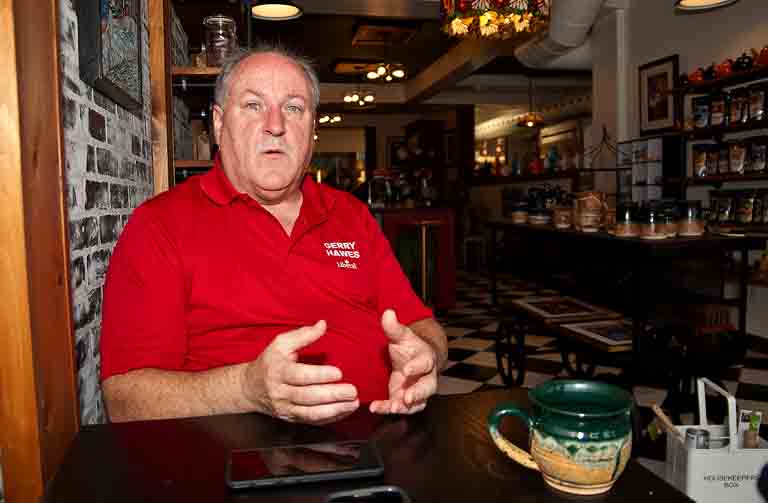
“The one I’m hearing most at the door is definitely climate change,” Hawes said.
“I’m not the Green (Party) candidate, but I am a green candidate. I have a lot of credentials in that regard. It’s something I’ve been taking seriously for a long time. I think we need to have a candidate, somebody elected from Simcoe North, who actually believes this is an existential crisis that needs to be dealt with and will lobby hard for those types of changes.”
“They’re not going to get that from the (current) local representation because his party doesn’t even really believe it’s a big problem. In the first term of office the Liberal government has done a ton on climate change, way more than they get credit for. Certainly far more than any other government in history has ever done. The carbon tax is one thing in a 50 point cohesive strategy that includes investments in public transportation, refits in buildings, plastics bans, all kinds of things that collectively are going to have a major impact.”
Hawes likes the Liberal platform has added more points to the 50, one of which is to incorporate 5 year milestones and updates to the plan at those intervals as a rule of legislation.
“The reason why that’s important is because we have a goal of reaching net zero emissions by 2050 and we also have a goal of surpassing our previous commitment by 2030. The only way you can meet those commitments that are so far down the road is having these 5 year steps that are legally binding that we have to live up to. If you don’t do that, down the road we just won’t do the heavy lifting. You are supposed to do the heavy lifting now.”
He believes the government’s plan is practical and provides a path that won’t ruin the economy. He thinks while we are dependent on oil we need to be aggressive moving away from it.
“When you are talking about transformative change like that, everybody has to work together on it and government has to be a partner because it won’t happen in the way we want it to or as quickly as we want it to if it’s not. Capitalists are smart people. They put their money where they can get the return they are looking for with the kind of risk they are willing to take. At some point when we’re talking about fossil fuel extraction, it will get to the point where it’s not a very desirable investment anymore and that is when we cross the threshold and get ourselves to the new place we want to be.”
“By demanding we don’t sell oil anymore, that doesn’t help anybody, we’re still using it. That’s just a silly argument. The way I look at it, currently the bitumen coming out of Alberta gets sold at a deep discount to the United States because we’re a captive supplier. They’re the only buyer for our bitumen. As a result we sell it cheap. It doesn’t make economic sense and transporting oil and bitumen and other fossil fuels by truck and train, we know that’s dangerous. It’s more risky than pipeline, so philosophically pipelines make sense while we still have to distribute that stuff. Someday we won’t have to distribute that stuff, but we are not there.”
He has an analogy Ontarians might understand.
“If by next year your car assembly plants are not assembling for electric cars we’re just going to shut you down because your transportation is 25% of the carbon emissions in Canada – people would go ballistic. It’s completely unreasonable. But that’s the similar demand people are putting on Alberta. It’s just not realistic.”
“To make these completely impractical demands of a jurisdiction to stop selling their product is going to put us into a national unity crisis, an economic crisis, and it totally ignores the fact that for the time being still, we require those resources.”
The Last Word
When asked what’s being left aside for discussion, he addresses an issue the Liberals have taken a lot of criticism over.
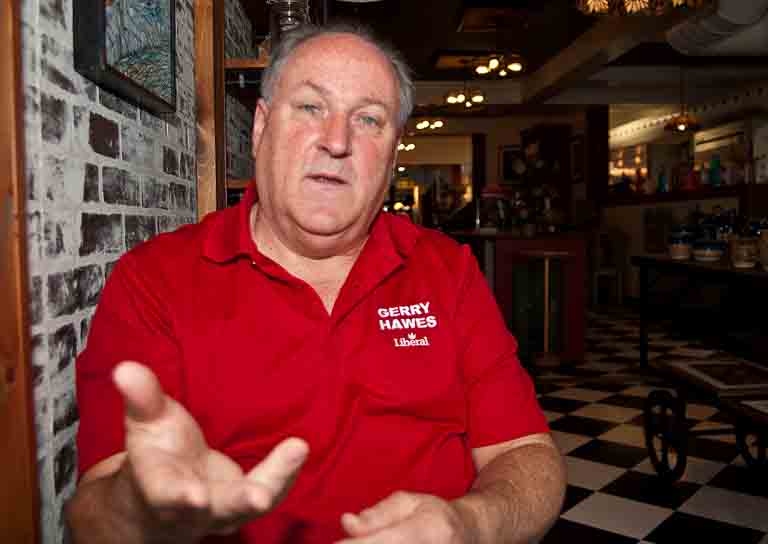
“The one thing would be the electoral system, first past the post. There’s a lot of disappointment we didn’t get rid of the first past the post system and I think we share that disappointment.”
“I don’t think the Liberal government should get all of the blame for that. The fact is we entered into a process in good faith where a parliamentary committee, which was supposed to delve into it and make recommendations. Because the Liberals had a majority government they should have been the majority on that committee, but in good faith the prime minister decide we’d sit as a minority on that committee and allow the opposition to have the majority.”
“In retrospect I think that was a mistake because what happened is parliamentary process pretty much got railroaded. The advocates of proportional representation only talked about proportional representation, but that’s’ just one model that could have been considered. The model I think they should have been looking at, at least in the immediate term, is ranked balloting at the local level so that at least when we elect a member of parliament that person isn’t getting elected by the minority if they don’t get past at least 50% on the first ballot.”
“In Canada there have been five referendums to try to get proportional representation and five referendums have failed. Let’s at least try to do something practical in the near term. As your member of parliament one of the first things I’m going to do is put forward a private member’s bill to try to get ranked balloting and get that discussion going. That is a practical, good way of engaging Canadians in the discussion. Rather than reaching for the brass ring and coming short every time, we’ve got to take another step.”
(Photos by Swartz – SUNonline/Orillia)
Other Candidates:

